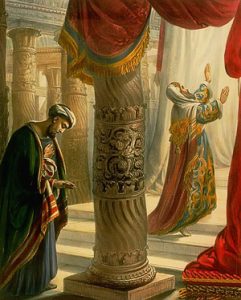H for Hypocrite
Among the members of religious associations of different denominations,
at times, there is a disease that sours relationships –
relationships with one another and, also, the relationship with… God.
Unfortunately, this affliction often remains without treatment,
even though it is truly harmful.
This disease is that of… ‘pharisaism’!
You smile, but you know very well what it is about.
Its symptoms are all too obvious.
Jesus has described them in a memorable way in one of his well-known parables.
 “To some who were confident of their own righteousness and looked down on everyone else,
“To some who were confident of their own righteousness and looked down on everyone else,
Jesus told this parable:
‘Two men went up to the temple to pray, one a Pharisee and the other a tax collector.
The Pharisee stood by himself and prayed: ‘God, I thank you that I am not like other people –
robbers, evildoers, adulterers—or even like this tax collector.
I fast twice a week and give a tenth of all I get.’
But the tax collector stood at a distance.
He would not even look up to heaven, but beat his breast and said,
‘God, have mercy on me, a sinner.’
I tell you that this man, rather than the other, went home justified before God.
For all those who exalt themselves will be humbled,
and those who humble themselves will be exalted’.” (Luke 18:9-14)
Display of arrogance,
despising others,
ignoring their good intentions,
being indifferent to their efforts to do good.
Being self-satisfied,
satisfied of one’s irreproachable conduct,
satisfied of one’s personal realizations worthy of admiration,
even satisfied of one’s exemplary religious practices!
Boasting about one’s achievements of all that is required… to impress people around!
God himself should be proud of such a servant faithful to all that can be expected of him!
The problem is that this apparently faithful servant is giving glory to himself
rather than thanking God who is helping him to become what he, God, desires.
This person is not aware that his fidelity is the work of God’s Spirit at work in him.
Such becoming aware is one of the essential attitudes required of us during this Lenten period.
 But, the 2nd reading (Tm. 4:6-8,16-18) presents us with another man, Paul the apostle,
But, the 2nd reading (Tm. 4:6-8,16-18) presents us with another man, Paul the apostle,
 ed in two verses of the Psalms:
ed in two verses of the Psalms: